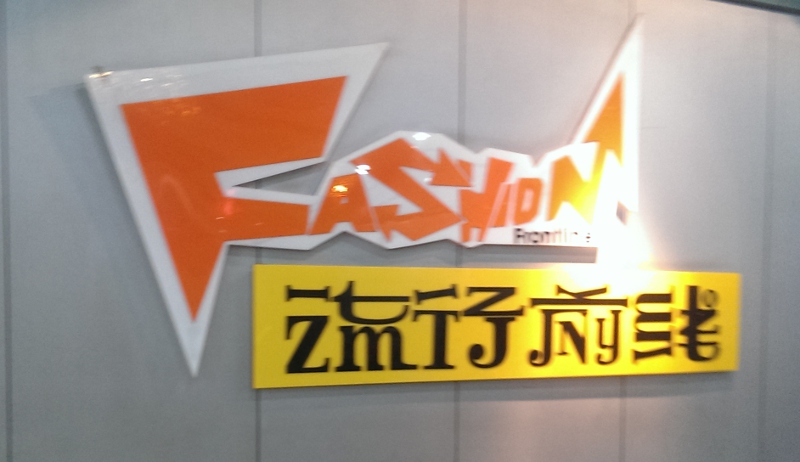Archive for Writing systems
September 8, 2014 @ 3:00 pm· Filed by Ben Zimmer under Language and technology, Writing systems
More than four years ago, on Aug. 23, 2010, Doctor Science left the following comment on a post by Mark Liberman, "Cell phone cupertinos":
I'm pretty sure I saw something several years ago about a whole dialect (argot? jargon? slang?) that had developed among young people in Japan (or possibly some other Asian country), based on phone cupertinos. Basically, they used the first suggestion from the autocomplete function *instead* of the original target word, to create an argot that was reasonably opaque to outsiders.
Now that comment has been brought back from the dead, appearing in two different articles about autocorrect.
Read the rest of this entry »
Permalink
August 26, 2014 @ 10:00 pm· Filed by Victor Mair under Phonetics and phonology, Tones, Variation, Words words words, Writing systems
A few months ago on the Penn campus I heard a Chinese guy and a girl having a conversation in Mandarin, and I was surprised when he twice said, "Wo3 ming2bai4 le." The rest of his speech was standard, but then he came out with this strange transformation of "Wo3 ming2bai le". Of course, I shouldn't have been surprised, because I've heard the exact same thing before. Nonetheless, it still sounded odd to me, since from first-year Mandarin on I've had it drilled into me that this sentence should be pronounced "Wo3 ming2bai le" and that any other pronunciation of ming2bai was wrong. This was reinforced by the canonical pronunciation ming2bai given in dictionaries and other authoritative sources.
Read the rest of this entry »
Permalink
August 22, 2014 @ 9:33 pm· Filed by Victor Mair under Language and computers, Writing systems
Lawrence Evalyn wrote to me saying that he received the official communication below about a new student card that is being issued by his university. He was perplexed by all the Chinese characters that got inserted in the text. They seem to appear consistently in certain places and for certain letters. [N.B.: The communication has been anonymized for posting on Language Log.]
Read the rest of this entry »
Permalink
August 20, 2014 @ 3:55 pm· Filed by Victor Mair under Alphabets, Humor, Writing systems
Tim Cousins sent in this photograph of a sign in a local mall in Dalian, northeast China.

Read the rest of this entry »
Permalink
August 20, 2014 @ 1:08 am· Filed by Victor Mair under Language and advertising, Topolects, Writing systems
Tom Mazanec noticed this ad for China Mobile by the baggage claim at the Guangzhou (Canton) Baiyun Airport a few nights ago:

Read the rest of this entry »
Permalink
August 17, 2014 @ 4:03 pm· Filed by Victor Mair under Borrowing, Topolects, Writing systems
We have often seen how the Roman alphabet is creeping into Chinese writing, both for expressing English words and morphemes that have been borrowed into Chinese, but also increasingly for writing Mandarin and other varieties of Chinese in Pinyin (spelling). Here are just a few earlier Language Log posts dealing with this phenomenon:
"A New Morpheme in Mandarin" (4/26/11)
"Zhao C: a Man Who Lost His Name" (2/27/09)
"Creeping Romanization in Chinese" (8/30/12)
Now an even more intricate application of alphabetic usage is developing in internet writing, namely, the juxtaposition and intertwining of simultaneous phrases with contrasting meaning. Here are a couple of examples:
Read the rest of this entry »
Permalink
August 14, 2014 @ 8:56 pm· Filed by Victor Mair under Language and education, Pedagogy, Writing systems
I was hoping that, after writing "Chineasy? Not", I wouldn't have to concern myself with this pedagogical bugaboo again. Wishful thinking! For reasons that escape me, the Chineasy juggernaut continues to rumble forward
Read the rest of this entry »
Permalink
July 29, 2014 @ 5:28 pm· Filed by Victor Mair under Borrowing, Language and culture, Language and education, Language and food, Morphology, Writing systems
In "Dead and alive: metaphors for (dis)obeying the law " (7/27/14), we discussed the food scandal that has rocked China in recent days. Abe Sauer had earlier made this post to the brandchannel: "China's Latest Meat Scandal Could Deal a Death Blow to Brands Like KFC " (7/23/14). In it, Abe remarked, "Taking a note from America's Watergate-based nomenclature, the scandal is being called 'Foul Meat-gate' ('臭肉门')." Ben Zimmer, who called Abe's post to my attention, asked, "Is '-gate' really working as a morpheme here?"
Read the rest of this entry »
Permalink
July 22, 2014 @ 2:39 pm· Filed by Victor Mair under Humor, Topolects, Writing systems
David Moser sent this photo to me about five years ago and I'm only now getting around to unearthing it from the masses of files scattered over my desktop:

Read the rest of this entry »
Permalink
July 16, 2014 @ 8:11 pm· Filed by Victor Mair under Language and religion, Language and the movies, Topolects, Writing systems
Dungan is a Sinitic language spoken by the descendants of Hui (Muslim) refugees who fled from northwest China after a failed revolt against the Qing (Manchu) government about a century and a half ago. Experiencing horrible losses along the way, their remnants settled in parts of what are now Kazakhstan and Kyrgyzstan, where ultimately they thrived and are quite successful today, particularly in growing produce.
Naturally, separated as they were from their homeland and its speech community, the language of the Dungans has undergone considerable change, especially through the borrowing of terms from Russian, Persian, Arabic, Turkic, and other languages. Even more radical was the adoption of the Cyrillic alphabet for their writing system (nearly all of those who fled were illiterate in Chinese characters).
For a brief introduction to the Dungans and their language, see "Dungan: a Sinitic language written with the Cyrillic alphabet".
Read the rest of this entry »
Permalink
July 11, 2014 @ 6:02 pm· Filed by Victor Mair under Animal behavior, Etymology, Language and biology, Lost in translation, Writing systems
The typhoon that struck Okinawa a few days ago and is now passing by Tokyo is called Neoguri. It gets it name from a Korean word meaning "raccoon dog".
The Japanese refer to it as Taifū 8-gō Neoguri 台風8号ネオグ リ ("Typhoon No. 8 Neoguri"), but most often without the "Neoguri" (see below for discussion of Japanese typhoon designation practices). However, the Chinese are calling it Huànxióng 浣熊 ("raccoon"), which is a clear mistranslation. The Chinese name for the raccoon dog is hé 貉 or háozi 貉子.
Read the rest of this entry »
Permalink
May 25, 2014 @ 6:09 pm· Filed by Victor Mair under Classification, Dialects, Topolects, Writing systems
For May 21, China Real Time Report, the China blog of the Wall Street Journal, featured an article entitled "Do You Dare Try the Devil-Language? China’s 10 Hardest Dialects" by Isabella Steger.
Read the rest of this entry »
Permalink
May 2, 2014 @ 8:31 am· Filed by Victor Mair under Diglossia and digraphia, Writing systems
Over at Lingua Franca, fellow Language Log author Geoffrey Pullum has an excellent article entitled "There Was No Committee".
Here's a key paragraph:
Some people talk as if Mandarin Chinese was gaining on English. It is not, and it never will. A Tamil-speaking computer scientist explaining an algorithm to a Hungarian scientist at a Japanese-organized scientific meeting in Thailand calls on English, not Chinese. Nowhere in the world do we find significant numbers of non-Chinese speakers choosing Mandarin as the medium for bridging language gaps. There are no signs of that changing.
Read the rest of this entry »
Permalink


